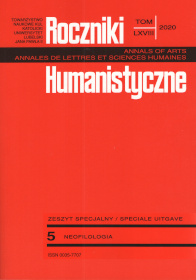Who is More Tolerant? The Perception of Imperatives in Polish and in Dutch in an Informal Context
Abstract
This contribution focuses on the perception of the imperative forms in spontaneous informal conversations among native speakers of Polish and Dutch, and reports on a pilot survey of standards of politeness. Since imperatives in Polish and Dutch are used qualitatively and quantitatively in a different way, we can assume that their perception is also different for native speakers of both languages. Using a survey consisting of, among other things, an assessment task, an attempt was made to investigate how polite the respondents think the imperative forms are, and how their assessment is influenced by the context of the utterance.
References
Beebe, Leslie M., en Martha Clark Cummings. “Natural Speech Act Data versus Written Questionnaire Data: How Data Collection Method Affects Speech Act Performance”. Speech Act Across Cultures: Challenges to Communication in a Second Language, red. Susan Gass en Joyce Neu, Mouton de Gruyter, 1996, pp. 65-86.
Bolden, Galina. “Requests for Here-and-now Actions in Russian Conversations.” Imperative Turns at Talk: The Design of Directives in Action, red. Marja-Leena Sorjonen, Liisa Raevaara, Elizabeth Couper-Kuhlen, John Benjamins Publishing Company, 2017, pp. 175-211.
Brown, Penelope, en Stephen Levinson. Politeness: Some Universals in Language Usage. Cambridge University Press, 2011 (1978).
Brown, Roger, en Albert Gilman, “Politeness Theory and Shakespeare’s Four Major Tragedies.” Language in Society, vol. 18, 1989, nr. 2, pp. 159-212.
Chen, Rong, Lin He en Chunmei Hu. “Chinese Requests: In Comparison to American and Japanese Requests and with Reference to the ‘East-West Divide’”. Journal of Pragmatics, vol. 55, 2013, pp. 140-161.
Cyluk, Agnieszka. “Discourse Completion Task. Its Validity and Reliability in Research Projects on Speech Acts”. Anglica. An International Journal of English Studies, vol. 22, nr. 2, 2013, pp. 101-112.
Czechowska, Anna. “O sposobach wyrażania prośby w języku polskim (na przykładzie wypowiedzi cudzoziemców)”. Poradnik Językowy, vol. 4, 2005, pp. 29-42.
“De Technoloog: Smart speakers zijn smart listeners”. 9.05.2018. Podcast van BNR Nieuwsradio, www.bnr.nl/podcast/de-technoloog/10343772/smart-speakers-zijn-smart-listeners. Geraadpleegd op 30.01.2019.
Doughty, Steve. “Why a Pole’s Politeness Can Be Lost in Translation”. MailOnline. 14 februari 2012, www.dailymail.co.uk/news/article-2100727/Why-Poles-politeness-lost-translation.html. Geraadpleegd op 30.01.2019.
Hofstede, Gert. Kultury i organizacje. Zaprogramowanie umysłu [Cultures and Organizations: Software of the Mind]. Polskie Wydawnictwo Ekonomiczne, 2000.
Lee, Cynthia. “A Cross-Linguistic Study on the Linguistic Expressions of Cantonese and English Requests”. Pragmatics, vol. 15, nr. 4, 2005, pp. 491-515.
Lee-Wong, Song Mei. “Imperatives in Requests: Direct or Impolite. Observations from Chinese”. Pragmatics, vol. 4, nr. 4, 1994, pp. 491-515.
Lubecka, Anna. Requests, Invitations, Apologies and Compliments in American English and Polish. A Cross-cultural Communication Perspective. Kraków, Księgarnia Akademicka, 2000.
Łaziński, Marek. “Polacy na tle innych systemów grzeczności”. Jak zwracają się do siebie Europejczycy, red. Małgorzata Marcjanik, Wydział Dziennikarstwa i Nauk Politycznych UW, 2013, pp. 15-32.
Mandelbaum, Jenny. “How to Do Things with Requests: Request Sequences at the Family Dinner Table”. Requesting in Social Interaction, red. Paul Drew en Elizabet Couper-Kuhlen, John Benjamins Publishing Company, 2014, pp. 215-241.
Marcjanik, Małgorzata. Polska grzeczność językowa. Kielce, Wyższa Szkoła Pedagogiczna im. Jana Kochanowskiego, 1997.
Marcjanik, Małgorzata. “Przez grzeczność na skróty. O nonszalancji zachowań młodego pokolenia”. Retoryka codzienności. Zwyczaje językowe współczesnych Polaków, red. Małgorzata Marcjanik, Warszawa, Wydawnictwo Trio, 2006, pp. 230-238.
Mondada, Lorenza. “Precision Timing and Times Embeddedness of Imperatives in Embodied Courses of Action. Examples from French.” Imperative Turns at Talk: The Design of Directives in Action, red. Marja-Leena Sorjonen, Liisa Raevaara, Elizabeth Couper-Kuhlen, John Benjamins Publishing Company, 2017, pp. 65-101.
Mulken, Margot van. “Politeness Markers in French and Dutch Requests”. Language Sciences, vol. 18, nr. 3-4, 1996, pp. 698-702.
Ochs, Keenan. “The Universality of Conversational Postulates”. Language in Society, vol. 5, 1987, pp. 67-80.
Ogiermann, Eva. “Politeness and Indirectness across Cultures: A comparison of English, German, Polish and Russian Requests”. Journal of Politeness Research, vol. 5, nr. 2, 2009, pp. 189-216.
Pęzik, Piotr. “Spokes: A Search and Exploration Service for Conversational Corpus Data”. Selected Papers from the CLARIN 2014 Conference, October 24-25, 2014, Soesterberg, The Netherlands, Linköping University Electronic Press, 2015, pp. 99-109.
Pisarek, Larysa. Recevye Dejstvija i ich Realizacija v Russkom Jazyke v Sopostavlenii s Pol’skom. Wydawnictwo Uniwersytetu Wrocławskiego, 1995.
Rossi, Giovanni. “Secondary and Deciant Uses of the Imperative for Requesting in Italian.” Imperative Turns at Talk: The Design of Directives in Action, red. Marja-Leena Sorjonen, Liisa Raevaara, Elizabeth Couper-Kuhlen, John Benjamins Publishing Company, 2017, pp. 103-137.
Imperative Turns at Talk: The Design of Directives in Action, red. Marja-Leena Sorjonen, Liisa Raevaara, Elizabeth Couper-Kuhlen, John Benjamins Publishing Company, 2017.
Vismans, Roel. “Modal Particles in Dutch Directives. A Study in Functional Grammar”, PhD thesis, Amsterdam, Vrije Universiteit, 1994.
Wiercińska, Katarzyna. “Diminutief als beleefdheidsstrategie: Een vergelijking tussen Nederland en Vlaanderen”. Roczniki Humanistyczne, vol. 64, z. 5, 2016, pp. 125-137.
Wiercińska, Katarzyna. “Op zoek naar perceptieverschillen bij directief taalgebruik in het Pools en in het Nederlands. Een onderzoeksvoorstel”. Germanica Pragensia, vol. 4, 2018, pp. 169-178.
Wierzbicka, Anna. “Different Cultures, Different Languages, Different Speech Acts: Polish vs. English”. Journal of Pragmatics, vol. 9, nr 1, 1985, pp. 145-178.
Wijst, Per van der. “The Perception of Politeness in Dutch and French Indirect Requests”. Text, vol. 15, nr. 4, 1995, pp. 477-501.
Zinken, Jörg, en Arnulf Depperman. “A Cline of Visible Commitment in the Situated Design of Imperative Turns. Evidence from German and Polish.” Imperative Turns at Talk: The Design of Directives in Action, red. Marja-Leena Sorjonen, Liisa Raevaara, Elizabeth Couper-Kuhlen, John Benjamins Publishing Company, 2017, pp. 27-63.
Zinken, Jörg, en Eva Ogiermann. “Responsibility and Action. Invariants and Diversity in Requests for Objects in British English and Polish Interaction”. Research on Language and Social Interaction, vol. 46, nr. 3, 2013, pp. 256-276.
Copyright (c) 2020 Roczniki Humanistyczne

This work is licensed under a Creative Commons Attribution-NonCommercial-NoDerivatives 4.0 International License.





